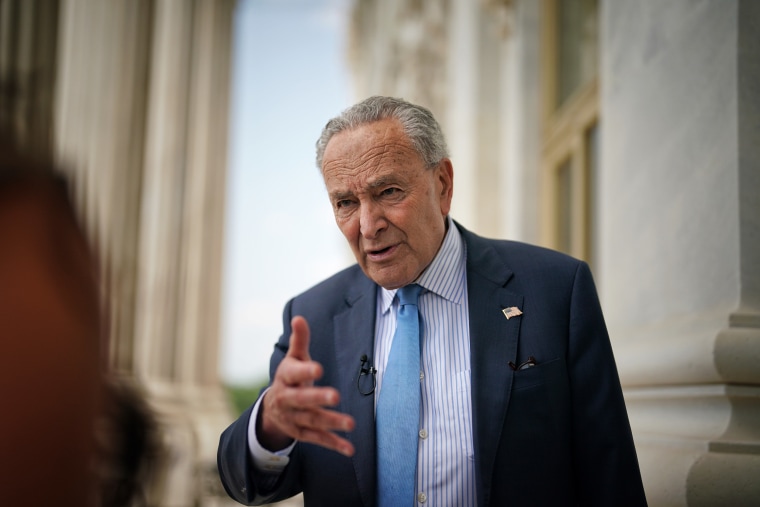WASHINGTON — Senate Majority Leader Chuck Schumer, D-N.Y., has spent the past year raising the alarm about the need for lawmakers to regulate artificial intelligence.
Just last week, tech billionaire Elon Musk, a Donald Trump backer, shared a parody deepfake video to his nearly 200 million followers on X featuring audio of Vice President Kamala Harris saying things she had never said.
Without guardrails for using artificial intelligence to depict political candidates, Schumer and others fear it could lead to a Wild West situation where deepfakes of Harris, Trump and others would proliferate in the media landscape — and undermine voters’ faith and trust in candidates, elections and American democracy.
“Look, deep fakes are a serious, serious threat to this democracy. If people can no longer believe that the person they’re hearing speak is actually the person, this democracy has suffered — it will suffer — in ways that we have never seen before. And if people just get turned off to democracy, Lord knows what will happen,” Schumer said in an interview Thursday on the balcony of his Capitol office.
With the window for legislative action quickly closing this calendar year and control of the chamber up for grabs, the powerful New York Democrat is eyeing must-pass bills as a vehicle to get something done on the fast-moving technology he’s labeled a threat to democracy and national security.
Schumer hinted to NBC News that two deepfake election bills could be attached to the must-pass funding bill needed to avert a government shutdown at the end of September — roughly a month before Election Day. And the majority leader said that the massive fiscal year 2025 defense policy bill that needs to be passed by Dec. 31 likely will include national security-related AI legislation as well.
The deepfake bills would ban deceptive, AI-generated audio or visual depictions of federal candidates designed to influence an election or solicit campaign funds and require disclaimers for any political ads made using AI. The pair of bills cleared the Rules Committee, but Republicans blocked them on the floor last week after Democrats tried to quickly pass them by unanimous consent — a process that requires agreement from all 100 senators.
In June, a bill banning deepfake pornographic images was also blocked by Republicans, who offered their own more narrowly tailored legislation they said would not chill free speech.
Schumer said Democrats will keep pushing.
“These are American bills. We are going to fight because democracy is at such risk,” he said. “We’re going to fight to get these done in every way that we can, and we hope our Republican friends will relent. As I said, we do have some Republican support. This is not a Democratic or Republican issue. Democracy is at risk if these deep fakes are allowed to prevail.”
The funding bill
Pressed whether the leader would dedicate extended floor time to the deepfakes bills when the Senate returns from its five-week summer recess on Sept. 9, Schumer pointed out there are only three weeks the chamber is scheduled to be in session before senators are sent back to the campaign trail for the election. The only legislative vehicle moving during that narrow window is a stopgap funding bill to keep the government open past the Sept. 30 deadline and through Election Day.
“We have three weeks when we come back. Two weeks are taken up by funding the government,” Schumer said, explaining the condensed calendar. “If we can get these on a must-pass bill, or if the Republicans will let us speed up the time and not just use delay for two, three weeks — yes,” the bills will be brought back to the floor.
The GOP’s 2024 party platform calls for the repeal of President Joe Biden’s executive order on AI, which Republicans say “hinders AI innovation.”
Republicans are standing in the way, Schumer said, because “Donald Trump, and so many of the Republicans who follow him, they don’t really like democracy, they don’t treasure democracy. So they’re putting pressure on Republicans to go against these bills.”
“It will be a dark mark on the entire long history of this beautiful Republic if we allow this to happen,” he added.

Historically, Congress has dragged its feet when it comes to regulating Big Tech. But with growing threats from China, lawmakers this past spring moved quickly to pass a potential ban on the popular video-sharing app TikTok in the U.S. unless its Chinese parent company sells it.
Proponents found success by arguing that TikTok is a national security threat, and Schumer and others say that same national security argument could secure some AI legislative wins on the defense policy bill, known as the National Defense Authorization Act (NDAA).
One proposed Schumer amendment to the NDAA would authorize physical and cybersecurity requirements on data centers that store advanced “frontier” AI models, while an amendment offered by Sen. Mitt Romney, R-Utah, would require training for some senior military officers on cyber, artificial intelligence and data analysis tools and capabilities.
A third amendment, authored by Sen. Brian Schatz, D-Hawaii, would require the Defense secretary to create AI implementation working groups throughout the Pentagon. There are many other ideas, as well, though it is unclear how many will come up for votes.
“We have lots of AI proposals in the defense bill because AI has national security concerns,” Schumer told NBC News.
Schumer’s priority
Schumer, 73, had not been seen as a leading voice on tech issues during his more than four-decade career in both the House and Senate. But last year, after AI chatbot ChapGPT made a big splash, Schumer — at the height of his power and influence — made clear that AI regulations would be the centerpiece of his legislative agenda for the 118th Congress, which ends in early January.
He gave a major AI address on what he called this “moment of revolution,” arguing that Congress needs to put guardrails in place to protect workers, national security and democracy while continuing to promote innovation and competition.
Schumer hosted nine AI “insight forums” where senators could hear from experts from a variety of fields offering ideas for potential legislation. One high-profile gathering featured a who’s who of tech titans, including Musk, Mark Zuckerberg, Bill Gates, Sundar Pichai, Sam Altman and Jensen Huang, among others.
And Schumer founded a bipartisan AI working group, or “gang,” comprising himself, and Sens. Martin Heinrich, D-N.M., Todd Young, R-Ind., and Mike Rounds, R-S.D. In May, the gang produced a “roadmap” for AI legislation, which called for $32 billion in annual nondefense funding to promote innovation.
In a separate interview last week, Rounds laid out the group’s legislative strategy: rather than unveil one big, sweeping AI package dictated by the gang, have different committees put their mark on relevant proposals and try to get the bills to the floor in a “piecemeal” fashion.
“What we wanted was not to do a mega bill. We wanted the individual committees to do the work on it. You’ll see it in the NDAA,” Rounds told NBC News. “So each committee will work at their own pace, and hopefully, the legislation that comes out will be well crafted and will be built with people that have knowledge of that particular area having lots of input.”
Schumer pointed to progress on a trio of AI-related bills last week that could head to the Senate floor.
He highlighted two of a spate of bipartisan AI-related bills that cleared the Senate Commerce Committee, including one that would direct the government to establish big, public databases that can be accessed by small businesses, academics and individuals to help with AI research. Another bill, the Future of AI Innovation Act, would allow the National Institute of Standards and Technology, or NIST, to set up AI safety standards aimed at fostering partnerships between business, government and academics.
Meanwhile, a third bill, the PREPARED for AI Act, passed the Senate Homeland Security Committee with key support from Chairman Gary Peters, D-Mich., and Sen. Thom Tillis, R-N.C. It would require federal agencies to assess the potential risks of using AI before purchasing or deploying AI systems.
“Obviously, AI has such amazing potential — cure cancer, deal with global warming, even give every kid a personalized tutor around the world. But it also has real problems,” Schumer said, referring to the Future of AI bill. “So what we need is we need innovation to be our North Star, but we need guidelines in this bill.”
,








